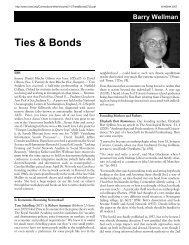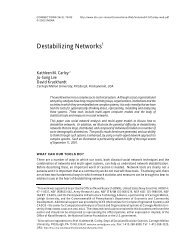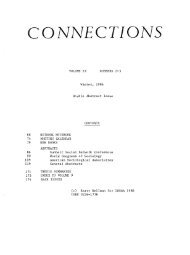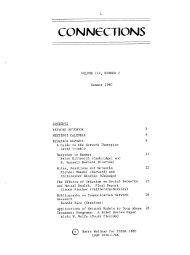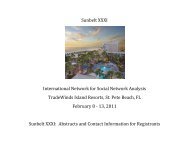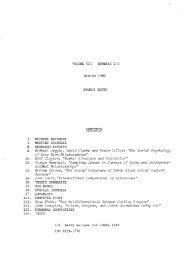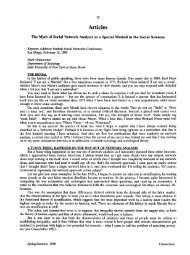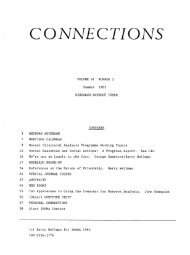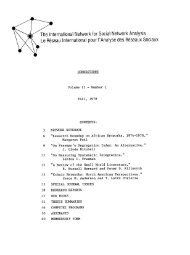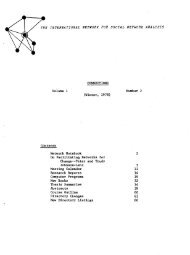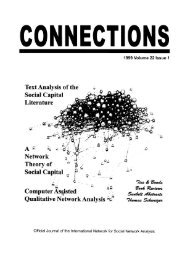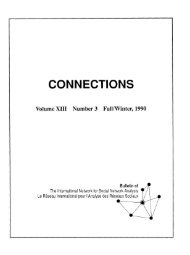(1979). Social Networks and Psychology. Connections, 2 - INSNA
(1979). Social Networks and Psychology. Connections, 2 - INSNA
(1979). Social Networks and Psychology. Connections, 2 - INSNA
You also want an ePaper? Increase the reach of your titles
YUMPU automatically turns print PDFs into web optimized ePapers that Google loves.
ABSTRACTSABRAMS, Philip (Sociology, Durham) . "Urban Collapse : Notes on the Non-Urban Nature of an Urban Phenomenon ."Paper presented at the '7lrban Change <strong>and</strong> Conflict Conference" Nottingham, Jan . <strong>1979</strong> .The revolution in urban sociology that has occurred in the last ten years has not yet been radicalenough . Specifically, the powerful arguments of Castells <strong>and</strong> others concerning the inadequacy of the 'urban'as either a scientific or a real object of analysis have seldom been taken to their logical empirical ortheoretical conclusions . Rather, in the face of a general consensus that the concept of an autonomous urbanrealm is now discredited, urban historians <strong>and</strong> sociologists (among them Castells himself) have persistentlydeclined to jettison the 'urban' <strong>and</strong> have sought rather to reconstitute it . In effect, the tendency ofrecent research has been to attempt to rescue an 'urban problematic' from the plainly demonstrated mystificationwhich all earlier attempts to study towns in terms of such a problematic have plainly involved .In this paper it is urged that the combination of theoretical formalism <strong>and</strong> naive empiricism which hassustained the focus on the town should finally be ab<strong>and</strong>oned ; a thoroughgoing attempt to unmask the urbanis called for, taking seriously the platitude that 'urban problems are problems in towns not problems oftowns' <strong>and</strong> recognizing that the socio-spatial organization of life chances is an inclusive process of totalsocial systems . This means that the relevant analytical net must be cast both more widely <strong>and</strong> constructedin terms of novel categories . It is argued that town <strong>and</strong> non-town need to be studied jointly <strong>and</strong> in interactionas manifestations of inclusive social processes which in important respects remain obscure if notinvisible within any sort of exclusively urban problematic . And that the appropriate object of study withinwhich urban phenomena should be absorbed is the 'complex of domination' . The notion of the complex ofdomination as a possible scientific object for erstwhile urban sociologists is examined . By comparisonwith strategies centres on conceptions of collective-consumption, finance-capitalism, reproduction oflabour power, estatism (whether involving absolute or relative autonomy of the state), social movementsor managerial distribution, it is suggested that analysis in these terms can achieve at once an appropriatelevel of generality <strong>and</strong> appropriate specification to types <strong>and</strong> cases in terms of theoretically varied modesin which complexes of domination may be realised .It is argued that the non-urban sociology of the complex of domination can account for relevanturban manifestations, structures, movements, conflicts, problems <strong>and</strong> so forth in ways which more narrowlyurban strategies of explanation can not .Beniger, James R ., Wesley Shrwn, Thomas Ash, Jerome M . Lutin (Princeton U .) . "Designing a Survey ofInformation <strong>and</strong> Favor Exchange <strong>Networks</strong> Among Regional, State, County <strong>and</strong> Municipal Levels of Government"Paper to be presented to the Annual Meetings of the American Statistical Association, Washington, D .C .,August 13-16, <strong>1979</strong> .This paper describes the design of a personal interview survey of 113 officials at various governmentallevels in New Jersey to determine interpersonal networks of information <strong>and</strong> favor exchange thatcharacterize interorganizational management, specifically planning of transportation in coastal zone areas .Sampling was from 43 governmental units, including two regional bodies, five state departments, <strong>and</strong> 16county, 11 township <strong>and</strong> nine municipal planning boards . In addition to background, attitudinal <strong>and</strong> personalpriority questions (yielding 313 variables), respondents were asked to identify contacts with 76governmental units <strong>and</strong> 29 individuals previously judged to be central to the planning process . Respondentswere also requested to list by name other contacts in each agency, <strong>and</strong> to specify whether : (1) contactwas by letter, telephone <strong>and</strong>/or in person ; (2) occurred once, several or many times ; (3) flow to or fromthe respondent ; (5) produced a relationship judged "smooth" or "not smooth" ; <strong>and</strong> (6) incurred a personalfavor earned or owed . Data were obtained on a gr<strong>and</strong> total of 4,710 contacts, a mean of 41 .7 per respondent .BICK. Wolfgang <strong>and</strong> Paul J . MuZZer (Koln) . "The Representation of Everyday Life Within Urban Bureaucracies ."Paper prepared for the 9th World Congress of Sociology, Uppsala . August, 1978 .Everyday life is increasingly reflected in administrative bookkeeping systems . This situatioU is theconsequence of the enlargement of municipal functions <strong>and</strong> the creation of urban <strong>and</strong> regional informationsystems within the overall development of the welfare state . The scope of administrative functions isbecoming more <strong>and</strong> more diverse . At the same time more people have become clients of a broad range offormal organizations . The penetration of society through a network of formal organizations has Increasedconsiderably .For the bureaucratic h<strong>and</strong>ling of these administrative functions, problems that might be regarded asdiffuse in everyday life, must be translated into functionally specific terms . As a result of functional



